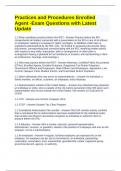Practices and Procedures Enrolled
Agent -Exam Questions with Latest
Update
1.1 What constitutes practice before the IRS? - Answer-Practice before the IRS
comprehends all matters connected with a presentation to the IRS or any of its officers
or employees relating to a taxpayer's rights, privileges, or liabilities under laws or
regulations administered by the IRS. (incl., not limited to; preparing documents, filing
documents, corresponding and communicating with the IRS, rendering written advice
with respect to any entity, transaction, plan or arrangement, or other plan or
arrangement having a potential for tax avoidance or evasion, and representing a client
at conferences, hearings, and meetings.)
1.1 Who may practice before the IRS? - Answer-Attorneys, Certified Public Accountants
(CPAs), Enrolled Agents, Enrolled Actuaries, Registered Tax Return Preparers,
Government Officers and Employees, State Officers and Employees, Appraisers, Low
Income Taxpayer Clinic Student Interns, and Unenrolled Return Preparers.
1.1 Other individuals who may serve as representatives. - Answer-An individual, a
family member, an officer, a partner, an employee, and a fiduciary.
1.1 Representation outside of the United States. - Answer-Any individual may represent
an individual or entity, who is outside of the US, before personnel of the IRS when such
representation also occurs outside the United States. See section 10.7(c)(1)(vii) of
Cir230
1.1 LITC - Answer-Low Income Taxpayer Clinic
1.1 STCP - Answer-Student Tax Clinic Program
1.1 Centralized Authorization File number - Answer-The CAF number merely confirms
that a centralized file for authorizations has been established for the individual under
that number and doesn't necessarily recognize an individual or authorize them to
practice before the IRS.
1.1 A fiduciary - Answer-AKA a trustee, executor, personal representative,
administrator, receiver, or guardian; stands in the position of a taxpayer and acts as the
taxpayer, not as a representative.
1.1 An employee - Answer-A regular, full-time employee can represent his or her
employer. An employer can be, but is not limited to, an individual, partnership,
corporation, association, trust, receivership, guardianship, estate, organized group,
governmental unit, agency, or authority.
, 1.1 A partner - Answer-A general partner can represent the partnership before the IRS.
1.1 An officer - Answer-A bona fide officer of a corporation (including a parent,
subsidiary, or other affliated corporation), association, or organized group can represent
any of the aforementioned. An officer of a governmental unit, agency, or authority, in the
course of his or her official duties, can represent the governmental unit, agency, or
authority before the IRS.
1.1 A family member - Answer-An individual can represent members of his or her
immediate family including spouse, child, parent, brother, or sister of the individual.
1.1 An individual - Answer-An individual can represent himself or herself before the IRS
and does not have to file a written declaration of qualification and authority.
1.1 Appraisers - Answer-Any individual who prepares appraisals supporting the
valuation of assets in connection with one or more federal tax matters is subject to the
regulations contained in the Circular 230. Appraisers have NO representation rights but
may appear as witnesses on behalf of taxpayers.
1.1 Attorneys - Answer-Any attorney who is not currently under suspension or
disbarment from practice before the IRS and who is a member in good standing of the
bar of the highest court of any US state, possession, territory, commonwealth, or D.C.
may practice before the IRS.
1.1 Certified Public Accountants (CPAs) - Answer-Any CPA who is not currently under
suspension or disbarment from practice before the IRS and who is duly qualified to
practice as a CPA in any US state, possession, territory, commonwealth, or D.C. may
practice before the IRS.
1.1 Enrolled Agents - Answer-Any enrolled agent in active status who is not currently
under suspension or disbarment from practice before the IRS may practice before the
IRS.
1.1 Enrolled Retirement Plan Agents - Answer-Any enrolled retirement plan agent in
active status who is not currently under suspension or disbarment from practice before
the IRS may practice before the IRS. The practice of enrolled retirement plan agents is
LIMITED to certain IRS code sections that relate to their area of expertise, principally
those sections governing employee retirement plans.
1.1 Enrolled Actuaries - Answer-Any individual who is enrolled as an actuary by the
Joint Board for the Enrollment of Actuaries who is not currently under suspension or
disbarment from practice before the IRS may practice before the IRS. The practice of
enrolled actuaries is LIMITED to certain IRS code sections that relate to their area of
expertise, principally those sections governing employee retirement plans.




